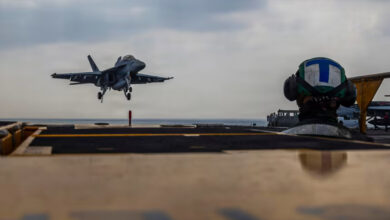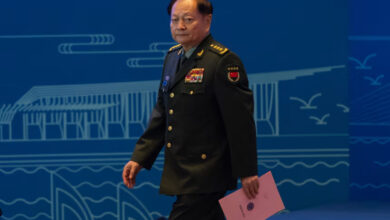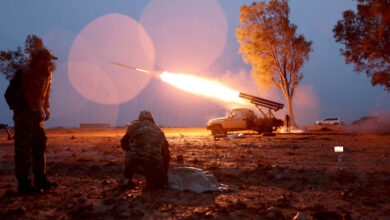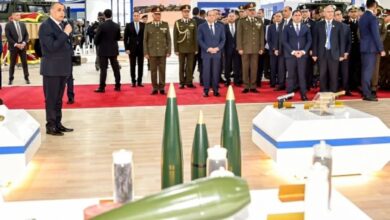As Egypt struggles to lay the foundations of a genuine democracy, the debate over the future role of the military in politics is intensifying, with some supporting limited concessions to the armed forces and others vehemently opposing their involvement in politics.
The debate gained momentum just recently as some prominent potential presidential candidates presented their stances on the military’s future role. Earlier this week, Justice Hesham al-Bastawisi, vice president of the Court of Cassation, released an elaborate document detailing his vision of military-civilian relations.
Besides its primary mission of protecting national territories, Bastawisi wrote that the military should be entrusted with the protection of the constitutional order. His document suggested that the armed forces become the guardian of a set of “supra-constitutional” principles, including respect for human rights, the protection of minority rights, commitment to international treaties and conventions that Egypt has already signed, social justice, the independence of the judiciary and prosecution, the autonomy of universities, the improvement of education and scientific research and commitment to the prerequisites of national security.
The document has already stirred much controversy in political circles. Bastawisi was criticized for granting the military far more powers than it has enjoyed previously.
“Bastawisi’s vision sends the people on vacation and makes the military the only locomotive of politics,” said Essan Soltan, vice president of the Islamist Wasat Party.
While some democratic voices insist that the military budget be discussed by Parliament, Bastawisi’s document delegates deliberations of the armed forces budget to a “National Defense Council". This body would include, among others, the president, the commander-in-chief and the armed forces chief-of-staff, and would assume overall responsibility for national security issues.
The document also says that the armed forces should be consulted before any military-related legislation is passed. The president should have the right to direct the armed forces to engage in any military operations outside the country, but only after getting approval from the Parliament, the National Defense Council, and the Supreme Council of the Armed Forces (SCAF), reads the document.
Batawisi’s proposal is believed to be inspired by the Turkish model, according to which the army is in charge of protecting democracy, secularism, human rights and loyalty to Turkish nationalism, as laid out by its constitution, while maintaining a certain degree of independence from any civilian government.
“This is an attempt to appease the military so that it does not resist the democratic transition,” said Sherif Younis, a columnist and historian with Helwan University, adding that such a proposal aims at securing the military a “safe exit” so that it will agree to hand over power to civilians in the knowledge that its privileges will not be touched.
Last month, presidential hopeful Mohamed ElBaradei released his own document, in which he proposed a set of basic principles that should be included in the new constitution. His document did not assign the military any political role. However, the former diplomat later told the state-owned daily Al-Akhbar that the military should safeguard democracy. ElBaradei was quoted as saying: “Today, we have a nascent democracy in a region that swarms with old ideas dating back to medieval times… Hence, we need the military to protect the constitution and the civil nature of the state during this phase of incipient democracy.”
But this does not mean that the military would intervene in “running affairs of state,” he added. In the meantime, the former diplomat said that the military should enjoy “some kind of autonomy” in handling its own affairs.
“Some candidates feel forced to [assign the military a political role]. The military is the strongest party on the political scene now and should get something,” said Younis.
The military establishment is the only pillar of the old regime that has remained entirely intact. By apparently siding with the revolution against former President Hosni Mubarak, the military has boosted its popularity. The generals have reiterated their commitment to the establishment of civilian democratic rule.
However, the performance of the SCAF so far has brought their commitment to democracy into question. Some of the laws they passed during the transitional phase, including those on political parties and the exercise of political rights, fell short of meeting many political forces’ basic demands.
The generals had repeatedly affirmed that they had no intention of fielding a military candidate for the presidency, a pledge that, if true, would mark a break from the legacy of the 1952 revolution, which brought four generals – Mohamed Naguib, Gamal Abdel Nasser, Anwar Sadat and Hosni Mubarak – to the presidency.
Yet, this is not to assume that the military desires to disengage completely from politics or submit to the control of a democratically elected civilian government, as is the case in most democracies. General Mamdouh Shahin, a SCAF member, has reportedly said that the new constitution should guarantee the military’s independence. The military might need to be assured that a democratically elected government will not meddle with its finances or suspicious arms deals.
Last month, SCAF head Mohamed Hussein Tantawi ordered that the Code of Military Justice be amended to give the military prosecution, rather than the Illicit Gains Authority, the right to investigate accusations of profiteering that could be leveled against incumbent or retired military officers. Some observers suspect that the amendment was an attempt to conceal corruption within the military.
The military is also expected to keep one foot in the political arena to safeguard the peace treaty with Israel, which remains a prerequisite for strategic relations with the US and the influx of American military aid.
Since its peace treaty with Israel in 1979, Egypt’s military has been the biggest recipient of US military aid after Tel Aviv, receiving nearly US$36 billion in military assistance – an annual installment of US$1.3 billion.
In the meantime, the military also seeks to protect its economic interests. “It [the military] commands a sprawling economic empire that produces a vast array of military and civilian goods and services, none of which appears in the national budget,” wrote Robert Springborg, renowned political expert on the Egyptian military. “Close observers liken Minister of Defense Tantawi to the CEO of the largest corporate conglomerate in Egypt.”
According to Amin Iskandar, leading founder of the Nasserist Karama Party, it would be difficult to entirely exclude the military from government decision-making due to its influence and leverage in society.
“The military has to remain part of the [political] equation,” said Iskandar.
Most of the proposals aimed at reaching a compromise with the military are driven primarily by fears that Islamists, who stand as the largest and best-organized political faction, would establish themselves in a form of a theocracy if they came to power. By asking the army to protect democracy, civil forces are trying to deter their Islamist competitors. Yet, stretching the military mandate could present a threat to democracy.
“Only the people can be the guardians of democracy,” said Ahmed Mekki, a retired reformist judge. To ask the military to safeguard democracy, political forces might be inviting the generals to stage coup d’etats in the future, which in itself is an undemocratic practice, warned Mekki.
“The Parliament, syndicates, political parties, the judiciary should be the ones in charge of implementing and protecting democracy. The army should only be in charge of waging wars,” said Mekki, former vice president of Egypt’s Court of Cassation.
However, according to Iskandar, Egyptian society might not be ready to play this role.
“We need an incubation period until we can establish a democratic society,” he said. Until then the military should protect the constitution, he added.
Iskandar’s companion, Hamdeen Sabbahi, with whom he founded the Karama Party ten years ago, has been the most generous presidential candidate with regard to the generals so far.
The Arab nationalist politician told Al-Masry Al-Youm in June that were he elected president he would give the military wider powers. He did not elaborate on what such powers would be.
While ElBaradei and Bastawisi assigned the military a political role out of necessity and political realism, Sabbahi might have vested interests, argued Younis.
“The Nasserist group is known for its support of the military establishment,” said Younis, adding that Sabbahi is trying, in return, to get endorsed by the army, thus boosting his chances of winning the election.
“The military has power over the media and has influence over different state institutions and local councils, so state employees or farmers can be pressured to go cast their ballot for a particular candidate,” said Younis.
In the meantime, there is a third camp of presidential candidates who have expressed their opposition to asking the military to protect democracy. In his first reaction to Bastawisi’s document, Amr Moussa, the former diplomat who announced his intention to run for the presidency, argued that safeguarding the constitution should not be the military’s exclusive role. The people and all state institutions, including the military, should assume this mission, he argued.
Moussa’s position surprised his detractors, who question his faith in democracy given his ties with the old regime.
“Is Moussa trying to appear more democratic than other candidates?” wondered Younis. “Anyway, he knows that the remnants of the old regime are going to support him, so it seems that with this statement, he is trying to gain supporters from the other camp.”
Despite his previous affiliation with the military, Magdi Hatata, a former chief-of-staff, has reportedly opposed Bastawisi’s proposal, contending that it paves the way for military authoritarianism. Hatata is expected to run for president.
So far, the military has not announced its backing of any presidential candidate, nor has it responded to proposals about its future role.
“The question is who can really secure the military a safe exit,” said Younis, explaining that the military can take such proposals seriously if they come from a candidate or political force that has sufficient support on the street to win an election.




